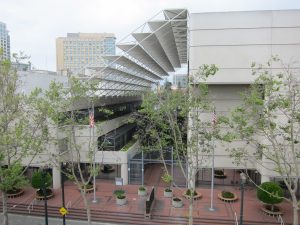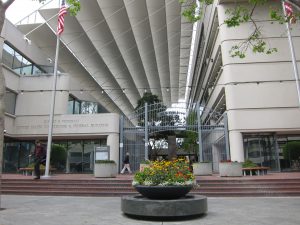Judge tells Avago Technologies Ltd., an alleged victim in the trade-secret theft case, that it can contest the demand.
By Sharon Simonson
SAN JOSE—A federal magistrate judge has granted a request from defense attorneys for Chinese professor Hao Zhang to issue a subpoena to Avago Technologies to demand Avago’s production of confidential records. San Jose-based Avago is a purported victim of Zhang’s trade-secret theft.

Judge Nathanael Cousins told counsel for Avago, Michael Martinez, in federal court on Wednesday that the company had until May 11 to seek to quash the subpoena in whole or in part. He also instructed Avago and Zhang attorneys to discuss how a protective order sealing the company’s documents from public view could ease communications.
“Do you expect you are going to make an objection?” Cousins asked Martinez.
“There were four document requests. I think it is likely we can agree on a couple of them,” Martinez replied.
In a late afternoon order, the judge set a June 15 hearing to consider the defense request and any Avago opposition.
Arrested nearly a year ago at the Los Angeles International Airport after federal agents boarded his plane as it remained on the tarmac, Zhang is accused of stealing technology with commercial and military applications in conspiracy with five other Chinese citizens and the Chinese government.
The 32-count indictment accused Zhang and the others of stealing source code, presentations, design layouts and other confidential and proprietary documents from Avago and Skyworks Solutions Inc., a Massachusetts company with offices in Santa Clara. Both Avago and Skyworks are semiconductor companies. The six men are accused of economic espionage, trade secret theft and conspiracy. Zhang faces 30 counts, fines of hundreds of thousands of dollars and extensive prison confinement. (Avago is now known as Broadcom.)
Zhang spent nearly eight weeks in the Santa Clara County main jail and remains under house arrest confined 20 hours a day to a Mountain View apartment. He was a professor at Tianjin University in China.
Tianjin is “providing necessary humanitarian and legal assistance” to him, according to a translation of a statement from the university published May 22 in The New York Times. In the same statement, the university defended Zhang’s integrity and its own. Zhang and his family were required to produce cash and assets equal to $500,000 to secure his release from jail.

Zhang earned his doctoral degree in electrical engineering from the University of Southern California in 2006. He traveled to the United States with his wife, who stayed with him for months, but who returned to China late last year when her visa expired.
Chinese and Chinese-Americans make up the largest Asian population in Santa Clara County with more than 160,000 people.
Documents detailing what Zhang’s attorneys seek from Avago were filed under seal in January and remain closed from public view. The court record is characterized at least in part by the number of sealed records including some orders of the court. The indictment itself was kept under seal for months and was only unveiled to the public after Zhang’s arrest.
In the minutes before the hearing started, the mood in courtroom 7 on the fourth floor of the Robert F. Peckham Federal Building and U.S. Courthouse at 2nd and East San Carlos streets in downtown San Jose was convivial. Defense attorneys, prosecutors and counsel for Avago caught up on personal and legal matters from aging relatives to sartorial style to the Department of Justice’s “Yates Memo.”
It was a marked contrast to the earliest hearings in the case in June and July and the moments before they began, when Zhang lead defense counsel Tom Nolan tussled with prosecutors and testily told the court that the federal government’s history of success in such cases was poor.
“Hi, Matt,” Nolan sang above the chatter upon the arrival of Assistant U.S. Attorney Matthew Parrella, who is prosecuting the case.
Zhang co-counsel Michael Brown and William “Mitch” Mitchelson of Alston & Bird, former federal prosecutors themselves but now seated at the defense table with Nolan, also stood and greeted Parrella. The men shook hands. “Thank you for responding to that email,” Brown said to Parrella.
Migrating to the prosecution’s table, Parrella held a whispered conversation with Avago attorney Martinez. “But that’s what they want to do,” Parrella said. “So if you need anything, have any issues….” Martinez responded in a low voice, gesturing with his left hand and then his right, extending his right index and pinky fingers.
Another laughing lawyer arrived. “How’s it going, Tom?” Assistant U.S. Attorney David Callaway called to Nolan.
“I’m surprised to see you here,” Michelson said to Callaway, as everyone again shook hands.
“I wouldn’t miss it,” Callaway said.
“Do you have time for a bite to eat afterwards?” Nolan asked.
The accused, who is in his late 30s, sat alone in the gallery, dressed casually in black loafers, white socks, tan pants and a dark vinyl jacket with a silver zipper up the front. He did not confer with counsel.
Zhang never worked for Avago, according to the federal indictment. Rather, co-defendant Wei Pang, also a Tianjin University professor, worked for Avago in Fort Collins, Colo., until the end of June 2009, the indictment says. Pang is ![]() not in U.S. custody. Zhang allegedly worked for Skyworks in Massachusetts until May 2009, when he became a full professor at Tianjin University.
not in U.S. custody. Zhang allegedly worked for Skyworks in Massachusetts until May 2009, when he became a full professor at Tianjin University.